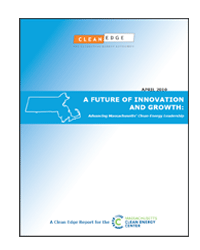A Future of Innovation and Growth: Advancing Massachusetts' Clean-Energy Leadership
 A Future of Innovation and Growth: Advancing Massachusetts’ Clean-Energy Leadership
A Future of Innovation and Growth: Advancing Massachusetts’ Clean-Energy LeadershipThe following is an excerpt from A Future of Innovation and Growth: Advancing Massachusetts’ Clean-Energy Leadership. To read the full report, please download the PDF file by clicking on the link to the left.
By a range of different measures, Massachusetts stands out as a clean-energy leader among states in the U.S. It has made the growth of clean energy a clear legislative and economic development priority in the state, with strong results to date in leading-edge policies, industry expansion, job creation, and increased investment and deployment.
This report, prepared by Clean Edge Inc. for the Massachusetts Clean Energy Center (MassCEC), compares and contrasts Massachusetts’ clean-energy leadership with other leading states by a variety of quantitative and qualitative measures. After an initial screening process to select the Top 15 clean-energy states in the U.S., we created a Leadership Scorecard comparing these states in 56 categories that encompass regulatory incentives, financial incentives, knowledge capital, and economic/workforce development. While this is not a definitive, weighted ranking, it provides an important and valuable benchmarking on states’ performance. Massachusetts places second in this ranking, behind only California. Rounding out the Top 15 clean-energy states are OR, CO, NJ, CT, NY, MD, WA, AZ, IL, FL, PA and TX.

Assessing Massachusetts Clean-Energy Assets and Barriers
The state’s Top 2 ranking, and much of what we heard from more than 20 interviews with leading clean-energy stakeholders in the state, places Massachusetts in an impressive and enviable position. The state’s world-class academic and innovation resources, strong government leadership, active venture capital community, highly educated workforce, and deep commitment to energy efficiency are among the strengths that make Massachusetts a clean-energy hub known the world over. The state is home to MIT and other leading clean-tech universities in the U.S. and its reputation as a clean-energy business cluster, led by the New England Clean Energy Council and other organizations, is considered among the world’s best.
Key barriers to clean-energy leadership that Massachusetts must address include the state’s high costs of living and doing business; limited natural resources for clean energy; the lack of a national, DOE-sponsored energy lab; permitting delays and local NIMBYism; and a less robust innovation-to-commercialism track record than some other states, particularly California.
Diversity and Innovation
Some states’ claims to clean-energy fame come mainly from growth and excellence in one sector, such as Texas and Iowa in wind energy or New Jersey in solar power. Massachusetts is different. Its leadership is broad and diverse, covering a wide swath of clean technologies under the very large umbrella of innovation. Companies like A123 Systems in advanced electric batteries, EnerNOC in efficiency and demand-side management, Konarka in organic photovoltaics, Beacon Power in flywheels, and General Compression in large-scale energy storage are all considered top innovators. Some of these firms, and dozens more clean-energy players in Massachusetts, grew out of university research in the state whose academic resources and intellectual capital are widely regarded as second to none. As one interviewee put it succinctly: “We have a lot of smart people.”
But innovation doesn’t only occur in university research labs or corporate conference rooms. Governments can also innovate, especially regarding relatively new sectors like clean energy, and Massachusetts’ public leaders and policymakers have done that. Governor Deval Patrick, Secretary of Energy and Environmental Affairs Ian Bowles, and Department of Energy Resources Commis¬sioner Philip Giudice all earn generally high marks for leadership on clean energy from this report’s interviewees and high rankings in this report’s comparative analysis matrices. The Global Warming Solutions Act, the Green Communities Act, and the Green Jobs Act (creating the MassCEC) lead a healthy list of leading-edge, aggressive policy initiatives. The state’s leadership in the Northeast states’ Regional Greenhouse Gas Initiative (RGGI), arguably the most successful cap-and-trade systems for carbon emissions in the U.S., has also been exemplary.
The Keys to Success: Innovation and Diversity
For the greatest impact, the state should play to its nation-leading strength in research, develop-ment, and innovation, across a range of clean-energy sectors. Efficiency, solar, and energy storage deserve special attention and policy support as key leadership sectors, but not to the exclusion of innovation, breakthroughs, and successful startups in a range of other sectors, including offshore wind, wave and tidal power, solid-state lighting, and low-carbon materials. It is that diversity that will continue to attract the best students, entrepreneurs, financiers, and policy experts from across the country and around the world keep Massachusetts-educated talent seeking to stay in the state. Ultimately, Massachusetts’ greatest clean-energy leadership is as a birthplace of ideas.
Strategy and Recommendations
But Massachusetts must do more to remain a clean-energy leader and to guarantee its global competitiveness. Based on our interviews with more than 20 stakeholders and our Top 15 benchmarking analysis, we recommend nine key actions that the state should take:
1. Establish an energy-efficiency innovation center and pursue a national Department of Energy (DOE) laboratory.
2. Adopt aggressive financial incentives for clean energy.
3. Establish a Massachusetts “Green Bank” to accelerate funding for clean-energy and energy-efficiency startups and projects.
4. Continue to increase commercialization of clean-energy research advances.
5. Institute an on-bill repayment system for energy-efficiency enhancements.
6. Boost regulations for building efficiency.
7. Streamline and hasten the local permitting process for clean-energy projects.
8. Take carbon-reduction leadership to the next level: nationwide
9. Play to the state’s strengths.
You can return to the main Market News page, or press the Back button on your browser.

